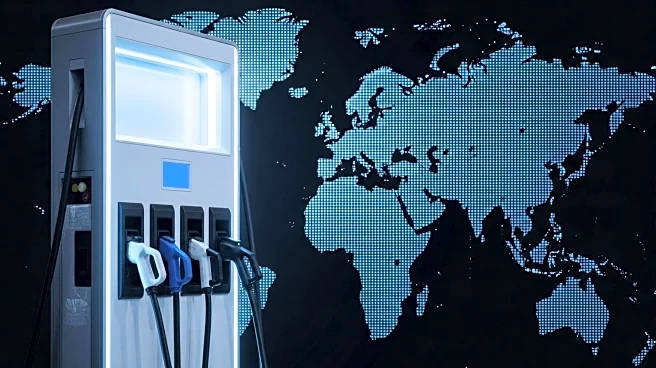What's Happening?
China EV Marketplace has launched a service allowing European customers to purchase Chinese electric vehicles (EVs) and plug-in hybrid electric vehicles (PHEVs) online, with direct delivery to their homes. This service includes clearing the vehicles through customs, providing convenience for buyers. The company claims to be the largest online shop for Chinese EVs, having sold 7,000 vehicles in the first half of the year, marking a 66% increase from the previous year. The service is available for both commercial and private customers, with a minimum order quantity of one vehicle. The marketplace offers models from established Chinese brands like BYD, Xpeng, Nio, and Leapmotor, as well as brands not yet present in Europe, such as Xiaomi. The service also includes importing Tesla models manufactured in Shanghai, which may appeal to European customers due to unique features not available in locally manufactured versions.
Why It's Important?
The expansion of China EV Marketplace into Europe signifies a growing trend of international vehicle sales and distribution, potentially altering the automotive market dynamics in the region. By offering direct sales and delivery, the company bypasses traditional dealership networks, which could lead to increased competition and lower prices for consumers. This development may challenge European automakers, prompting them to innovate and adapt to maintain market share. Additionally, the availability of Chinese EVs could accelerate the adoption of electric vehicles in Europe, contributing to environmental goals and reducing reliance on fossil fuels. However, the lack of local dealer support and compatibility issues with European charging standards may pose challenges for consumers.
What's Next?
As China EV Marketplace continues to expand its operations in Europe, it may face regulatory hurdles related to vehicle homologation and compliance with local standards. The company plans to handle these processes for a fee, but customers may opt to manage them independently. The success of this venture could encourage other Chinese automakers to explore similar direct-to-consumer sales models, potentially reshaping the global automotive industry. European automakers may need to enhance their offerings and customer service to compete effectively. Additionally, the marketplace's decision to cease operations in the U.S. due to tariffs suggests potential geopolitical influences on international trade.
Beyond the Headlines
The introduction of Chinese EVs to the European market raises questions about the long-term implications for local automotive industries and employment. The shift towards online sales and direct imports may reduce the need for traditional dealerships, impacting jobs and local economies. Furthermore, the reliance on Chinese manufacturing and technology could lead to increased scrutiny regarding data privacy and cybersecurity, given the vehicles' Chinese operating systems and standards. The cultural and linguistic differences in vehicle interfaces may also affect consumer satisfaction and usability.










